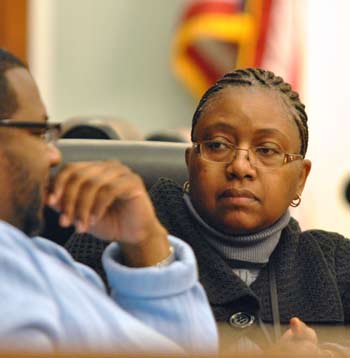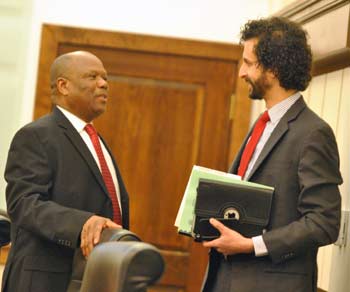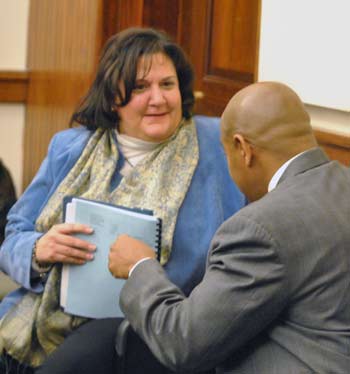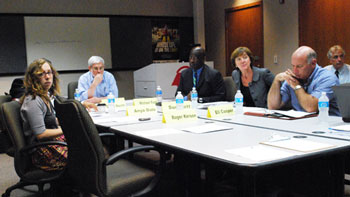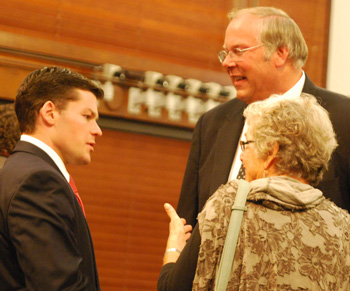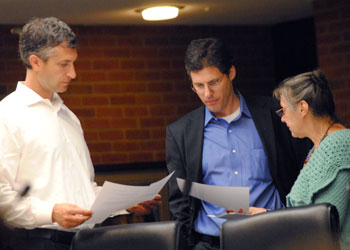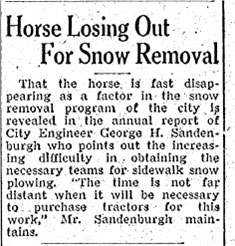Washtenaw County board of commissioners meeting (March 20, 2013): In its main action, the county board approved new long-term contracts with 15 of Washtenaw County government’s 17 bargaining units – including annual wage increases, a cap on employee healthcare contributions, and the elimination of “banked leave” days. The precedent-setting move aimed to protect unions before Michigan’s right-to-work law takes effect on March 28, and cut legacy costs for the county.
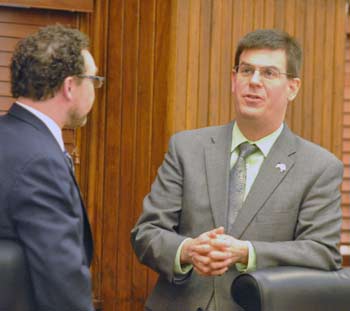
From left: Conan Smith (D-District 9) and Dan Smith (R-District 2) at the Washtenaw County board of commissioners meeting on March 20. Dan Smith cast the lone vote against new contracts with labor unions representing county employees, citing concerns over the length of the agreements. Most of the contracts run through Dec. 31, 2023. (Photos by the writer.)
About 85% of the nearly 1,300 county workers belong to a union. The board also approved similar wage and benefit changes for the county’s non-union employees.
The right-to-work law will make it illegal to require employees to support unions financially as a condition of their employment, but labor agreements in place prior to March 28 will not be affected until they expire. Most of the previous contracts with the county’s labor unions were set to expire on Dec. 31, 2013. All but one of the new deals will run for more than 10 years – through Dec. 31, 2023.
Dan Smith (R-District 2) cited the length of those contracts as a reason for casting his no vote – he was the only commissioner to vote against the union contracts, though he supported the agreement for non-union employees. The duration eliminates the flexibility to deal with different conditions that might face the county in the future, he said. There is no “re-opener” clause that would allow either side to renegotiate before 2023.
Despite his no vote, Smith praised the most significant changes that will impact employees hired after Jan. 1, 2014. Those employees will participate in a defined contribution retirement plan, instead of the current defined benefit plan – the Washtenaw County Employees’ Retirement System (WCERS). In defined benefit plans, retirees receive a set amount per month during their retirement. In defined contribution plans, employers pay a set amount into the retirement plan while a person is employed. The most common defined contribution plan is the 401(k). Similar changes in retiree healthcare plans will also affect new employees.
The shift in the county’s approach to retirement plans and retiree healthcare was a major concern for several other commissioners. While acknowledging the benefits of eliminating the county’s legacy costs, Conan Smith (D-District 9) cautioned that retirees could be put at risk without the predictable stability of a defined benefit plan. However, he also noted that the board can’t continue to put the institution at risk by “guaranteeing something that we don’t know we’re going to be able to afford in the long run.”
Those legacy costs were a factor alluded to during the March 20 discussion, linking to another major decision that is expected to come before the board: bonding to cover the county’s unfunded liabilities for employee pensions and retiree healthcare. The issue hasn’t been discussed directly at any of the board’s regular meetings, but commissioners have been informed that a proposal likely will be brought forward by administration.
Based on actuarial valuations at the end of 2011, the county had $101.27 million in unfunded liabilities for its defined benefit pension, and $148.46 million in unfunded liabilities for its retiree healthcare. Those amounts will be higher when the 2012 actuarial valuations are completed later this year. The new accounting standards of GASB 68 require that unfunded liabilities must be included in an organization’s financial statements for fiscal years beginning after June 15, 2014.
Commissioners also got a year-end 2012 financial update during the March 20 meeting – the final 2012 audit will be brought to the board in April. Total revenues exceeded total expenditures by $2.26 million. The county had planned for a surplus of $1.889 million to carry into 2013 – so the year ended with an excess of $327,607 above that targeted amount.
In other action items, the board voted to form a committee that will explore the feasibility of creating a land bank, and appointed three people to the committee: Commissioner Ronnie Peterson (D-District 6), county treasurer Catherine McClary, and Mary Jo Callan, director of the county’s office of community & economic development. The committee is directed to report back to the board by Aug. 7, 2013.
During communications from the board, Conan Smith reported that the southeast Michigan Regional Transit Authority board has now been fully appointed, and will convene on March 28 for an orientation meeting. He suggested that the two Washtenaw County representatives – Richard “Murph” Murphy and Liz Gerber – come talk to commissioners about what the county’s interests and priorities are. “The earlier we weigh in, the more systemic the impact of our comments are going to be,” he said. “If we don’t talk to them until they’ve already made decisions, then it’s going to be too late.” [Full Story]





